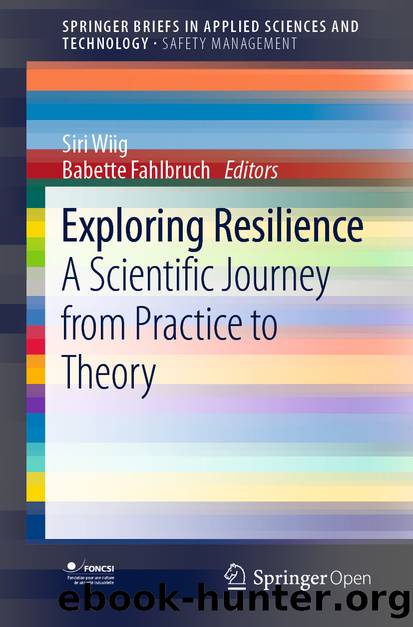Exploring Resilience by Unknown

Author:Unknown
Language: eng
Format: epub
ISBN: 9783030031893
Publisher: Springer International Publishing
8.5 Three Strategic Recommendations
If one accepts my argument that organizational resilience is closely tied to the ability to function in different modes of operation and to successfully manage switches between these modes of operation, three strategic recommendations follow. First, leaders and their teams need to be trained in these abilities. Crew Resource Management training in aviation is a very successful example for such trainings. But even these trainings still have their challenges, such as extending them from cockpit crews to cabin crews along with the necessary appreciation for adaptive delegation of leadership [16]. Amalberti [27] has also pointed to the difficulty of trainings being attached to a particular mode of operation and underlying assumptions and rules for that mode. Thus, if trainings are to enable leaders and their teams to switch been modes operations, these underlying assumptions need to be addressed as well. An interesting example in this respect is a recent study by Weiss and colleagues [31]. The authors showed that after-event reviews conducted as part of training sessions for anesthesia teams led to more speaking up if assertiveness was emphasized, but also to more hierarchy-attenuating beliefs. Only if leaders share the view that hierarchy can come in the way of safety in certain situations, successful transfer of trained behaviors to the real world will ensue.
This leads to the second recommendation. To truly embrace different modes of operation requires bridging the worldviews embedded in the different approaches to managing stability and flexibility. Resilience depends on a shared understanding across professional boundaries of the legitimacy of different kinds of leadership in response to tensions concerning control and adaptive capacity, which may even entail deliberate promotion of uncertainty in some cases [28, 38]. Perspective taking and cross-learning among the different professions involved in safety are crucial to reflect on and reconcile the diverse belief systems and to create shared views on problems and on ways to solve them. Leaders are called upon to facilitate these processes and to encourage the needed organizational change.
The third recommendation, finally, concerns the relationship between operating organizations and regulatory agencies. Different worldviews do not only exist within organizations but - most likely even more so - between organizations, especially when they have very different tasks and roles such as operating versus regulating and inspecting safety-critical processes. Thus, a shared view of the legitimacy of different modes of operation has to also be established between operating organizations and their regulators and auditors. Depending on the given regulatory regime [20] this is a more or less daunting task. When regulation is prescriptive, a shared perspective on what is adequate behavior is more important, but especially acceptance of empowered modes of operation may be more difficult to achieve due to that same regulatory preference for highly standardized processes. Only if an open dialogue between operator and regulator is established, can the operational flexibility which lies at the heart of resilience be effectively realized.
Open Access This chapter is licensed under the terms of the Creative Commons Attribution 4.0 International License (http://creativecommons.
Download
This site does not store any files on its server. We only index and link to content provided by other sites. Please contact the content providers to delete copyright contents if any and email us, we'll remove relevant links or contents immediately.
Four Thousand Weeks by Oliver Burkeman(1838)
What Happened to You? by Oprah Winfrey(1760)
Karma by Sadhguru(1601)
This Changes Everything by Unknown(1499)
You Are a Badass: How to Stop Doubting Your Greatness and Start Living an Awesome Life by Jen Sincero(1170)
Don't Sweat the Small Stuff...and It's All Small Stuff by Richard Carlson(1112)
Infinite Circle by Bernie Glassman(1046)
How to Do the Work by Dr. Nicole LePera(1001)
Let's Talk About Hard Things by Anna Sale(982)
Declutter Your Mind: A step by step guide to learn to control your thoughts, stop worrying, relieve anxiety and eliminate panic attacks and negative thinking by Mia Chandler(953)
Who Moved My Cheese? by Spencer Johnson(948)
The 4-Hour Workweek by Timothy Ferris(946)
Real Strength: Build Your Resilience and Bounce Back From Anything by Psychologies Magazine(934)
The Path of Greatness--The Game of Life and How to Play It and Other Essential Works by Florence Scovel Shinn(915)
Breakup Bootcamp by Amy Chan(891)
Be Your Best Self by Mike Bayer(885)
Curative Magic by Rachel Patterson(875)
The Book of Hope by Jane Goodall(861)
Advice for Working Moms (HBR Working Parents Series) by unknow(859)
